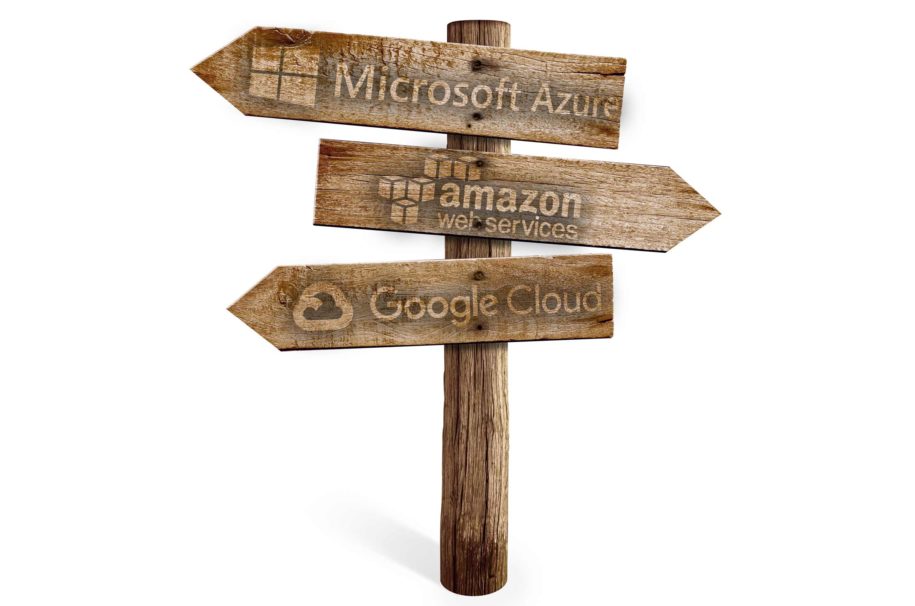Comparison of the 3 Leading Cloud Players
The pace at which the data has been piling up and growing worldwide, there has been an explicit need to place all that data in one place where it stays safe and could be reached anytime. It’s been long since the question has been converted from “should we switch to the cloud services or not?” to “which should be selected?” AWS, Azure, and Google Cloud have been the best and leading the market in recent years.
Many small, large, and startup companies are now taking the decision to avail the cloud providers. The advent of cloud computing has allowed many businesses to get started quickly and at a much lesser expense and this is how businesses got rid of the physical servers’ installations. Having your data stored in Cloud has allowed freedom to the companies of keeping up with the increased traffic.
Services/Features



Regions
- Regions
- Regions and Availibility Zones
- Regions and Zones
App Hosting
- Cloud Services
- AppService
- Service Fabric
- Elastic Beanstalk
- App Engine
SQL Database/ Relational
- Database for MySQL
- SQL Server Database
- Database for PostgreSQL
- RDS (Aurora)
- Database for MySQL
- Cloud SQL
- Cloud Spanner
- Database for MySQL
IoT
- IoT Hub
- IoT Edge
- IoT Core
- IoT Greengrass
- Cloud IoT Core
NoSQL Database
- Table Storage
- Cosmos DB
- DynamoDB
- SimpleDB
- Cloud Datastore
- Cloud Bigtable
Networking
- Virtual Network
- Direct Connect
- Network Service Tiers
- Cloud Interconnect
Security
- Security Center
- Shield
- Macie
- GuardDuty
- WAF
- Cloud Security Scanner
- Cloud DLP
Serverless computing
- Web application architecture
- SaaS integration
- IoT back end
- Mobile back end
- Image Moderation Chatbot
- NYC Parks Events Crawler
- Retweet Leaderboard
- Document Generator
- Lambda
- Knative
- Kubernetes Engine Serverless add-onALPHA
- Serverless containers on Cloud FunctionsALPHA
- Serverless application backends
Cloud Monitoring
- Log Analytics
- Monitor
- CloudTrail
- CloudWatch
- Stackdriver
Storage Services
- Blob Storage
- Disk Storage
- File Storage
- Queue Storage
- DataLake Store
- Simple Storage Service (S3)
- Elastic Block Storage (EBS)
- Elastic File System (EFS)
- Snowmobile
- Edge
- Storage Gateway
- Cloud Storage
- Persistent Disk
- Transfer Service
- Transfer Appliance
Storage queues
- REST-based PUT/PEEK /GET interface
- Storage queues are applicable when the device can store 80GB
- AWS console
- Command Line Interface
- 2 types of message queues
- Serverless application backends
- Real-time data processing systems
- Intelligent applications
SLA
- 99.9% availability -Azure Active Directory B2C service
- 99.9% – Azure Active Directory Domain Services
- 99.9% – Azure Analysis Services
- 99.95% – API Management
- 99.95% – App Service
- 99.9% – Cache
- 99.9% – Content Delivery Network
- 99.95% – Cloud Services and Virtual Machines
- 99.99% SLAs – Azure Cosmos DB
- SLA is applied separately to each account of CloudFront
- 99.999% – Amazon DynamoDB
- 99.99999999999 % – Amazon S3
- 99.99% – Amazon Compute
- 99.95% – Amazon RDS
- 100% Available – Amazon Route 53
- 15-minute interval considered 100% – AWS Lambda
- Availability interruptions can cause entitlement to 100 % service credit – AWS Shield Advanced
- Depends on service commitment -Amazon S3
- 99.9% – Cloud Filestore
- Depends on Monthly Uptime Percentage – Cloud Firestore Service
- Depends on Monthly Uptime Percentage – Cloud IoT Core
- Depends on Monthly Uptime Percentage
Compute Services
- Virtual Machine Scale Sets
- Virtual Machines
- Container Instances
- Azure Container Service (AKS)
- Batch
- Service Fabric
- Cloud Services
- Batch
- EC2
- Elastic Container Service for Kubernetes
- Amazon Elastic Container Service for Kubernetes
- Amazon Elastic Container Service for Kubernetes (Amazon EKS)
- Elastic Container Service
- Elastic Beanstalk
- Elastic Auto Scaling
- Elastic Load Balancing
- Container Registry
- Fargate
- Lightsail
- VMware Cloud on AWS
- App Engine
- Compute Engine
- Kubernetes
- Container Security
- Cloud Graphics Processing Unit (GPU)
- Functions
- Knative
Service Bus queues
- first-in-first-out (FIFO)
- Atomic operation support
- Push-style API
- Batched receive and Batched send
- Amazon Kinesis Data Streams
- Amazon Simple Queue Service (SQS)
- SQS FIFO
- Pub/Sub
- Cloud Tasks console
Distinctive Features
- High integration with other applications
- Known for its IaaS platform
- Strong department is containers
Now, let’s get some knowledge about the biggest 3 cloud players:

Microsoft Azure addresses the needs of almost all types of customers, Azure IoT solutions offer PaaS/SaaS technologies which allow the customers to build their own path for their own solutions. Azure PaaS solutions being customizable allow a high level of control over connected products and operations.
These customizable solutions can be tailored according to the complex needs and provide pre-built solutions such as analytical maintenance, associated factory, device simulation, remote monitoring, and ability to deploy within no time, enhanced time to value, and solutions that render definitive control.

Azure SaaS minimizes the IoT effort and makes a quick start possible. The quick start with Azure SaaS provides more time, money, and the expertise to develop the connected products that the company lacked before. Microsoft has proved itself to devise and introduce a mature solution that treats IoT implementation requirements.
SQL Server engine compatibility along with the native virtual network (VNET) support with SQL Database Managed Instance offered by Microsoft Azure makes the best platform for the best SQL server. Besides all that, its fully managed service also has operational and cost benefits. Managed Instance is the platform that is ideal for migrating an existing massive SQL Server database from the on-premises system or virtual machines to SQL Database.
The programming languages that are supported by Microsoft Azure are available in two versions of Azure Functions runtime which are 1.x and 2.x. the languages supported include C#, JavaScript, F#, Java, Python, TypeScript, PHP, Batch (.cmd, .bat), Bash, and PowerShell.
There is a comprehensive series of pricing system, of which each one offers the services at incredibly affordable prices. Each pricing category is specified according to the volumes of database systems. From small to medium databases pricing ranges from $0.02/hour to $0.64/hour for temporary storage ranging from 20 GB to 2,040 GB and RAM from 0.75 GB to 14.00 GB. For large databases, $0.35/hour for temporary storage 490 GB along with 14.00 GB up to $1.41/hour for temporary of 2,040 GB along with RAM 56.00 GB.

AWS Cloud Provider, a platform of cloud storage and service which provides cutting-edge technological solutions to an extensive range of business types including startups, public sector organizations, mega projects, and large organizations in the enterprise. AWS has made it way easier to store all your media in one place and at very inexpensive rates. No matter how large your digital data is, it will be stored safely in encrypted, redundant storage which can be accessed anytime.
AWS has a comprehensive set of cloud storage services which can be availed for archiving purpose. Amazon Glacier is a perfect option for an affordable and non-time cloud storage for sensitive data while Amazon Simple Storage Service (S3) is the one that offers faster storage depending on the customer’s business needs. AWS Storage Gateway provides all means to build a comprehensive storage solution.
Backup solutions that AWS provide are durable and secure that ensure safe data transfer, networking, and protect the stored data. AWS Backup is known for its scalability, flexibility, and providing durability beyond one can expect. Once the data is backed up in AWS Cloud, it can be archived in Amazon Glacier which is able to deliver 99.99999999999% durability, only at the expense of $0.004 / gigabyte / month.
AWS IoT provides in-depth functionality and allows the customers to build IoT solutions across a wide range of devices. An amazing feature of AWS IoT offers is that it integrates with AI services even without internet connectivity. AWS IoT size up the evolutionary processes in your business and the growing number of devices. Its all-encompassing security features can generate an instant response to potential security issues.

AWS supports the programming languages that are Java, JS, .NET, PHP, Python, Ruby, Go programming language SDK, and C++ programming language SDK. Choosing the right kind of language that befits your business type is crucially important. As each programming language has its different characteristics.
AWS offers amazingly flexible budgets that allow the customers to decide the custom cost and you will be notified when cost exceeds your threshold budget. The initial two budgets are offered without any charges while each following budget then incurs $.02 / day. AWS Cost Explorer API allows the access to an ad-hoc query engine which powers AWS Cost Explorer. Every request incurs a cost of $.01.

Google Cloud Platform is a wonder in itself as the features, services, and APIs it provides make up a lengthy list. The one proof that confirms the popularity of Google Cloud Platform is that 49% of IT managers use Google Cloud Platform.

live migrations of virtual machines along with absolutely no traceable decline in performance while live migrating is performed to Virtual Machines between the host machines. Without worrying about machine reboots, engineers are now able to address the issues such as repairing, patching, software and hardware updating, and all that is made possible because of the live migrating.
All the encrypted data among Google, the customers, and data centers are in transit. The data is encrypted under 256-bit AES. Only the authorized and authenticated requests from other components are processed due to the storage stack and layers of Google applications. Also, having relationships with some world’s biggest ISPs enhances the security of data transit.
Google Cloud Storage offers for multiple storage types that are Coldline storage, nearline, regional storage, and multi-regional storage. It is designed to provide 99.999999999% durability. The data is stored redundantly and its integrity is ensured with automatic checksums. The multi-regional storage stores the data in two regions which makes it less likely to lose your data despite a technical or technological disaster.
Cloud SQL feature of Google Cloud Storage when enabled, is responsible for recognizing the need to add storage to the existing database storage and this operation of checking the available database storage is practiced every 30 seconds. This makes it the best platform to provide quick and continuous maintenance at the expense of low storage costs.
Google Cloud Platform supports the programming languages; Java, Node.js, Python, Go, Ruby, PHP, C#, and .NET. The pricing policy for Google Cloud Platform offers hourly billing rates for various instance classes. Billing can be enabled for your project/s and it can also be disabled which will mean that the fixed billing will still be charged for your project.

